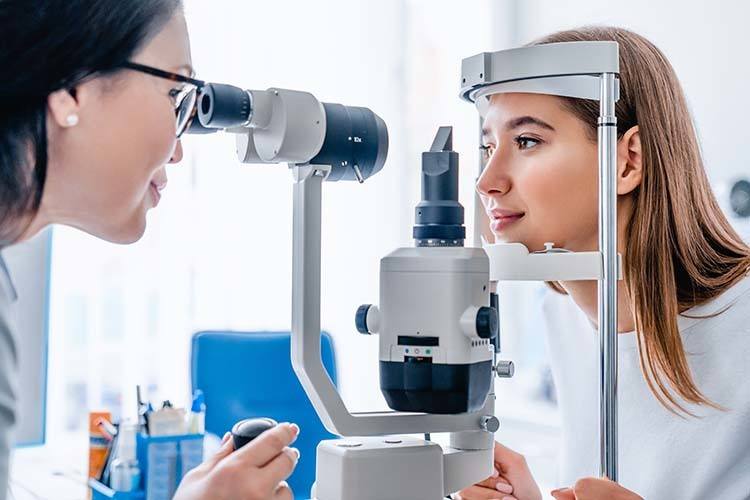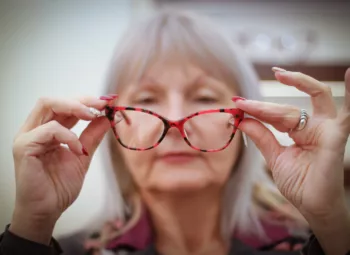
4 Health Tips for Lowering Your Risk of Developing Cataracts
Cataracts are the leading cause of preventable blindness worldwide. An estimated 95% of people in the United States over the age of 65 are affected by age-related cataracts (Nuclear Sclerotic Cataracts). When left untreated, age-related cataracts grow progressively larger and will result in decreased vision and eventual blindness.
In this article, cataracts will be clearly defined, along with the risk factors and tips for lowering the ones that can be mitigated.
What are Cataracts?
A cataract is a build-up of proteins that cloud and harden the lens of your eye. Your eye’s lens is responsible for focusing the light that enters your pupil, allowing you to see clearly. A cataract will obscure the light as it passes through the lens, causing a disruption in vision. If left untreated, cataracts can continue to get progressively bigger, ultimately leading to total blindness.
What Causes Cataracts?
Aside from aging and carrying a hereditary tendency to contracting them earlier, other risk factors for developing cataracts, according to Stanford Medicine, include the presence of the following health issues:
- Diabetes
- Obesity
- Hypertension (high blood pressure)
- Smoking
- Past eye injury or inflammation
- Steroid medications
- Years of excessive sun (and UV rays) exposure
How Can I Reduce My Risk of Cataracts?
Though many of the risk factors for Cataracts are out of a patient’s control, there are several that can be addressed.
1. Reduce Sun Exposure

Reducing exposure to Ultraviolet (UV) rays, while supporting good skin health, also helps protect the cornea, where cataracts form. The following practices will manage your exposure:
- Wearing a wide brimmed hat, or ball cap, when in the sun
- Avoiding outdoor activities during the peak hours of 11:00 am to 4:00 pm, when possible
- Wearing oversized or wraparound sunglasses that have 100% UVA and UVB protection
- Protecting against UV rays even on a cloudy day, and especially when near a body of water or other highly reflective surface
2. Lifestyle Changes

Maintaining a healthy diet, including foods that support eye health, and exercising regularly can reduce the risk of obesity, high blood pressure, and diabetes, all of which can contribute to cataract development.
In addition, kicking a smoking habit can reduce the likelihood of cataracts and so much more. Steroids can also be a factor, which may be unavoidable. If prolonged use of prescribed steroids is a concern, the patient’s doctor may have a viable alternative. Avoiding non-prescribed steroids is a given.
3. Avoid Eye injury or Inflammation

Accidents will happen, but taking some easy precautions can decrease the chances of eye damage or inflammation, which can increase the chances of contracting cataracts.
Following the simple motto of “all the gear, all the time,” during the following activities that may require helmets, face, or protective eyewear, will decrease the chances of eye injury drastically.
- Operating machinery
- Playing sports
- Riding a motorcycle
- Riding a bicycle or scooter
In addition, further protection can be assured by being careful, mindful, and adhering to all safety measures when participating in dangerous activities or traversing difficult terrain.
4. Schedule Regular Eye Exams

Anyone over the age of 40 should have a comprehensive eye examination at least once every two years. If one or more risk factors are present, exams may need to be scheduled more frequently.
With regular exams, cataracts are typically detected by an ophthalmologist before symptoms have become apparent. In addition, during an exam, other conditions may be caught that can be treated before they contribute to the forming of cataracts.
Lower Your Risk of Vision Loss with a Cataract Screening at NeoVision
At NeoVision Eye Center, our ophthalmologists specialize in the early diagnosis and treatment of all age-related eye conditions. If cataracts are detected during an exam, there are ways to slow their growth, though ultimately, cataract surgery is the only treatment.
To ensure the longevity of your eye and vision health, contact our specialists at Neovision today to schedule a comprehensive eye exam.
Are you concerned about cataract development?
Have all your cataract questions answered by board-certified ophthalmologist and cataract surgeon Dr. Tandon during a free consultation.
"*" indicates required fields





